
Tell us what you need to find a matching loft conversion specialist

Get free quotes from professionals near you

Compare offers and choose the one that best matches your need
- Householdquotes.co.uk
- Driveway
- Driveway Materials
- Cheapest Driveway
What Are the Cheapest Driveway Options?


- The top three most inexpensive driveway materials are gravel, asphalt and concrete.
- The average cost of a cheap driveway is between £2,500 to £3,750 for a 30m2 driveway. The cost will depend on the material you choose.
- Opting for a straight driveway can save you money on materials and labour compared to a curved one.
Your driveway is the first thing people notice when they arrive at your home, so it's essential to make sure it's functional, durable, and attractive. However, with the cost of living increasing in the UK, renovating your driveway without breaking the bank can be difficult.
But don't worry, we've got you covered. There are plenty of affordable options available to create a beautiful driveway that suits your budget.
In this article, we will explore some inexpensive driveway ideas that will help you make an informed decision for your home. We will delve into the pros and cons of the cheapest driveway paving options, such as gravel, concrete, and asphalt, considering cost, durability, maintenance, and visual appeal.
Whether you're looking for a simple and budget-friendly gravel driveway or a more polished concrete surface, we have just the solution for you.
With our expert guidance, you can create an entryway that improves your home's security and curb appeal and provides a long-lasting investment that you can be proud of.
The best way to get the most value for your driveway is to obtain multiple quotes from different driveway installers.
However, finding a reliable installer can be frustrating and time-consuming. You need to consider factors like experience, trustworthiness, and quote breakdown. This is where Household Quotes can help.
Fill out our 30-second form, and we'll provide you with four free, non-binding quotes from local driveway specialists who meet your needs and preferences. Don't waste another minute—click below to begin.
- Describe your needs
- Get free quotes
- Choose the best offer
It only takes 30 seconds

What are the cheapest driveway options in the UK?
The cheapest driveway option is gravel compared to other materials such as resin, brick paving, or cobblestone. Gravel is easy to source and in ample supply, making it the cheapest driveway option. Moreover, it is durable and long-lasting, providing a great return on investment. On average, the cost of gravel for materials only ranges between £35 and £55 per m2.
Many driveway materials are cheap, durable, and long-lasting, though gravel may not suit everyone's tastes or needs. Here are the top three cheapest driveway options:
- Gravel
- Asphalt
- Concrete
The average cost to install a driveway in the UK is between £6,000 to £6,700 for a small driveway, according to Rated People. However, these materials will only cost between £2,500 to £3,750 for a 30m2 driveway.
These materials are cost-effective because they are readily available and straightforward to install, making the entire building process more affordable.
We have listed the driveway cost of the cheapest driveway materials below for your convenience. Additionally, we have included a table of the most expensive materials for comparison purposes.
| Cheap driveway options | Average cost per m2 |
|---|---|
| Gravel | £35 to £55 |
| Concrete | £20 to £60 |
| Asphalt | £40 to £70 |
| Expensive driveway options | Average cost per m2 |
|---|---|
| Resin | £60 to £100 |
| Brick Paving | £60 to £105 |
| Cobblestones | £20 to £70 |
Although cobblestone driveways may initially seem as affordable as asphalt driveways, the above costs are for materials only. Due to higher labour costs, installing cobblestone is more expensive than asphalt, concrete, or gravel.
It is important to note that the cost of each driveway option varies depending on the quality and grading chosen and the specific materials used.
Regarding budget driveway ideas, opting for gravel, asphalt, or concrete can be cost-effective. However, weighing the advantages and disadvantages of each material is essential to determine the most suitable option for your budget and requirements.
Below, we have outlined the cheapest driveway alternatives to make your decision-making process more manageable.
Gravel driveway
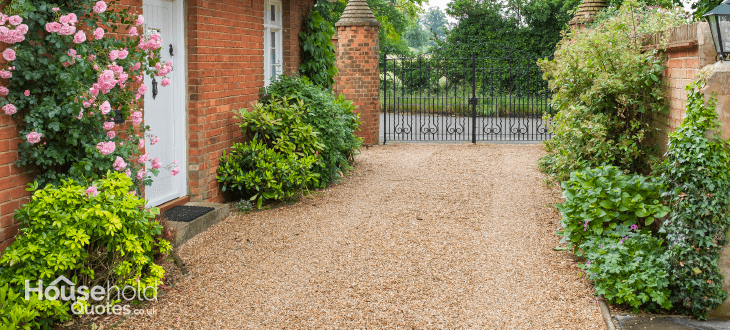
Gravel is the cheapest driveway option available. It is made up of small stones and rocks that are obtained from natural deposits, riverbeds, or quarries. These deposits are abundant, and therefore, the cost of extracting gravel is reduced.
Additionally, gravel requires minimal processing and refinement compared to asphalt or concrete, making its production easy. Not only is it low in cost, but the reduced energy used to obtain gravel makes it an eco-friendly option for your driveway.
Gravel driveways are among the fastest and simplest types to install. Depending on the size and shape of your driveway, they usually take one to two days to install.
However, it may take longer if your driveway is more intricate or unique. The quick installation of a gravel driveway also means that labour costs are reduced.
The gravel driveway cost for a two-car driveway covering an area of 40m2 will typically be around £2,500, according to Price Your Job. However, the final cost can vary depending on the size, shape, and materials used.
Various materials are available for a gravel driveway, so it's worth considering your options carefully before deciding. These materials include:
- Crushed rock gravel
- Pea gravel
- River rock gravel
- Self-binding gravel
- Marble chip gravel
Crushed rock gravel is the most budget-friendly gravel material. At an average cost of £52.53 per m2, according to NorthWest Aggregates, it is perfect for creating an entryway that exhibits durability, longevity and stability.
While it is not the most attractive, it is an excellent budget driveway idea for those of you trying to stay within your budget.
Despite being the cheapest driveway material, it has many benefits to offer. Below we discuss the benefits of gravel driveways:
- Affordable: Gravel driveways are the cheapest driveway material. On average you can expect to pay between £35 to £55 per m2 for supplies.
- Easy installation: Gravel can be installed in one to two days with minimal work. The gravel is spread over the driveway after the groundwork, weed barrier, and subbase are installed
- Easy to repair: Damaged gravel driveways can be quickly and affordably fixed by adding more gravel to the affected area
- Compacts well: The stones for these driveways naturally compact as they are used, creating a stable and durable surface
- Excellent drainage: Gravel’s porous nature allows water to penetrate, preventing puddles and flooding. Areas in the UK with heavy rainfall benefit significantly from this feature, making it ideal for them
- Versatile: Gravel driveways offer a variety of materials and colours to choose from, catering to your aesthetic preferences
- Acts as a crime deterrent: Gravel driveways deter burglars because they create noise when walked on, making it less likely for them to approach homes or cars with gravel driveways
While gravel driveways offer numerous benefits, it's essential to consider their drawbacks before installing them, which will help you make an informed decision and choose the best driveway surface for your needs. Here are the drawbacks you should know about before opting for a gravel driveway:
- Weed Growth: Without a weed barrier, driveway maintenance increases as weeds grow through the porous, loose stones.
- Dusty: During warm weather, car and foot traffic can kick up dust from the surface beneath your driveway, spreading dust and dirt
- Uneven Surface: The loose gravel on the driveway creates an uneven surface, increasing the risk of falls and making it difficult for people using mobility aids to move around.
- Prone to washing away: During heavy rain, the surface of your gravel driveway may wash away, exposing the sub-base underneath and creating a muddy driveway. This requires replenishing, which, while easy to do, can be time-consuming.
- Prone to potholes: Loose stones in the driveway can cause potholes when a car moves over them.
Although gravel is the cheapest driveway option, it requires more maintenance than asphalt or concrete. If you are looking for a budget-friendly and low-maintenance driveway, there may be better options than gravel.
Asphalt driveway
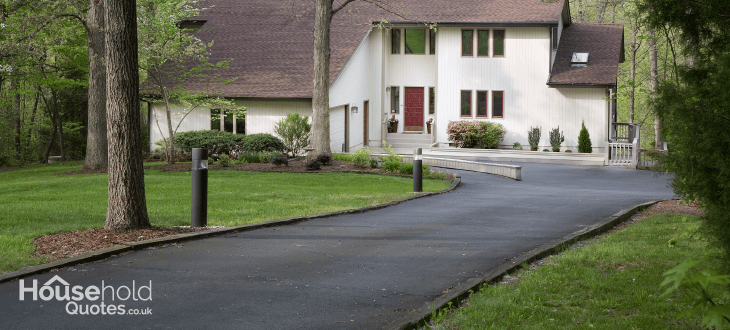
Asphalt is the most commonly used material for driveways. This material is one of the cheapest driveway options available due to its widespread availability, much like gravel.
Asphalt combines aggregates such as gravel, sand, or crushed stone with bitumen, a petroleum byproduct. The material is also affordable due to the competitive market, which reduces overall costs.
There are several types of asphalt driveways available that can suit any needs and preferences; these include:
- Hot-mix asphalt: This is the traditional type of asphalt that is quicker to process, leading to lower costs and faster installation.
- Warm-mix asphalt: This type of asphalt is processed at cooler temperatures, reducing carbon emissions. It is an excellent option for those looking for an eco-friendly alternative.
- Porous asphalt: This type of asphalt is more porous than traditional asphalt because it creates voids in the mixture. It provides good drainage and helps reduce rainwater runoff.
Installing an asphalt driveway takes two to three days. However, unlike gravel, asphalt requires up to five days to cure. Using an asphalt driveway before it has completely cured can damage the surface and leave indents.
The average cost of installing an asphalt driveway is approximately £2,850 for a 30m2 driveway, according to MyJobQuote. On top of asphalt being on of the cheapest driveway options, it is also met with a wide range of benefits, such as:
- Low maintenance: Asphalt driveways have a smooth surface, which makes them easy to maintain and clean. They only require an occasional sweep to remove debris, making them a hassle-free option for those who want a low-maintenance driveway.
- Easy to repair: A damaged section of your asphalt driveway can be repaired without affecting the entire driveway, saving you time and money.
- Quick installation: It takes 2-3 days to install. After the groundwork is complete, asphalt is poured, reducing labour costs.
- Durable: Asphalt’s flexibility allows it to endure heavy traffic with less cracking, resulting in lower repair costs.
Although it is a low-maintenance, cost-effective driveway option, there are still some drawbacks of asphalt driveways, such as:
- Susceptible to heat: Excessive heat can cause the asphalt on your driveway to soften, leading to deformations under the weight of your car and eventual ruts and dents.
- Susceptible to cold: During colder temperatures, water can penetrate your asphalt driveway and cause cracks when it expands and contracts during thawing.
- Non-porous: Traditional asphalt driveways do not allow water to pass through, which means that a drainage system must be installed to prevent flooding. Without a drainage system, your driveway may become flooded. Moreover, the asphalt surface can collect pollutants from your car, harming water systems when rainwater washes them off your driveway.
- Environmental impact: Traditional asphalt production requires substantial energy, which can contribute to increasing greenhouse gas emissions and harm the environment.
Concrete driveway
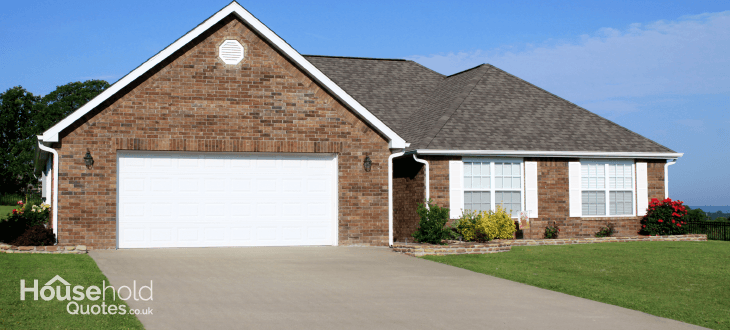
Concrete is known for its durability and affordability, making it an excellent choice for driveways and use in the construction of buildings and bridges worldwide.
This material is made from cement, water, and aggregates such as gravel, sand, and crushed rock. It is readily available, which keeps its overall cost down. In addition, the manufacturing process for concrete is straightforward, allowing for mass production and further cost reductions.
Concrete driveways typically take between one to three days to install. Compared to other complex driveways like block paving or cobblestones, the labour costs are lower due to the simplicity of the installation process.
The average cost of a 30m2 concrete driveway is around £3,750. While more expensive than asphalt or gravel, it is still one of the cheapest driveways available. It is also the most durable option.
Below, we have listed the benefits of having a concrete driveway.
- Low maintenance: Concrete driveways require less maintenance, with occasional cleaning and resealing to prolong their lifespan and maintain their appearance.
- Versatile: Customising the appearance of your driveway to match your aesthetic preferences is easy with concrete. It can be stamped, stained, or textured to mimic the look of more expensive materials like stone or brick.
- Heat resistant: Concrete is heat resistant which means it is unlikely to crack or melt when exposed to heat.
- Smooth surface: The smooth surface of a concrete driveway is ideal for those using mobility aids, as it reduces the risk of tripping or falling compared to driveways with loose stones or gaps.
- Longevity: Concrete is a durable and cost-effective material that can last up to 50 years, according to NaraText, making it a great long-term investment for heavy traffic areas.
Concrete is the best driveway material for durability, low maintenance, and cost-efficiency. However, to determine whether concrete is the right choice for you, it is essential to consider the drawbacks of installing a concrete driveway.
- Affected by freeze-thaw cycles: During cold weather, water can penetrate concrete, freeze, expand and then contract upon thawing, leading to damage and cracking in your driveway.
- Stains and discolouration: Concrete’s light colour makes it susceptible to stains and discoloration. Without maintenance, your driveway can appear dirty.
- Difficult to repair: Once concrete driveways are damaged, is it difficult to repair. Extensive damage requires the entire driveway to be replaced so its important to regularly maintain to ensure this does not happen.
Choosing the cheapest driveway option that fits your needs and budget, it's essential to weigh the pros and cons of each option, considering both initial and long-term costs. Finding the right balance between affordability and functionality is key to ensuring your driveway lasts for years to come.
Budget driveway ideas
When it comes to cheap driveways, several budget driveway ideas are practical, cost-effective and can enhance your property's curb appeal, which includes:
- Gravel driveway with edging
- Gravel and grass
- Driveway made of recycled materials
- Tar and chip
- Stamped concrete
Gravel driveway with edging
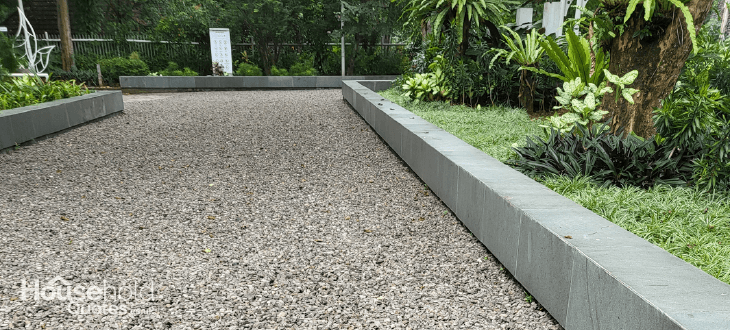
Gravel with edging is a cheap driveway idea that is a visually appealing option for the overall look of your property. Edging also helps to prevent the gravel from eroding and shifting over time.
By choosing gravel, you can save on initial costs. At the same time, edging will reduce the need for frequent replenishment of your driveway, saving you money in the long run.
There are several types of edging you can choose from:
- Concrete
- Brick
- Timber
- Metal
Deciding which edging to choose for your gravel driveway depends on several factors, the most important of which are your taste and budget.
The most popular choice for edging is brick, which typically costs around £30 per linear metre. However, preformed concrete edging is a more affordable option at an average cost of £25 per linear metre.
Timber edging is also an option, and it is cheaper at around £6.50 per linear metre. However, wood is prone to rotting, so regular maintenance will be necessary.
Gravel and grass driveways
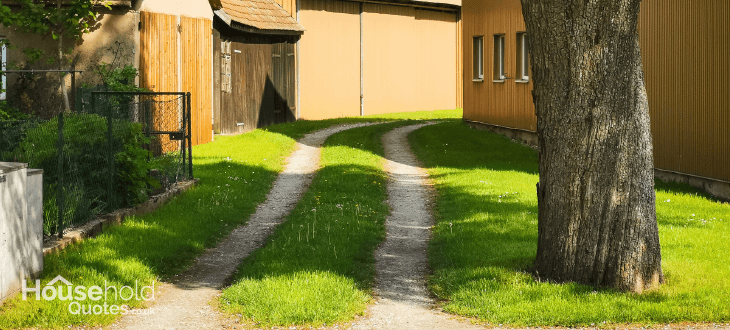
Grass and gravel driveways are an excellent option for those who want a natural-looking entryway to their home whilst keeping costs down. This type of driveway consists of one or two paths made from gravel that your car can drive on, with the rest of the driveway covered in grass.
Adding grass can also help prevent a muddy driveway during heavy rain by reducing flooding and the risk of the gravel strips becoming muddy. However, it's important to note that maintaining the grass will require more effort. Despite this, the benefits of having a grass and gravel driveway often outweigh the extra maintenance required.
Tar and chip driveway
If you want a cheap driveway idea similar to asphalt then tar and chip is your best bet. On average, it will cost around £550 to £1,500 for a two-car driveway, according to Paul Robinson at Refurbb, which makes it considerably cheaper than asphalt,
Tar and chip driveways offer a plethora of benefits, including low maintenance, great traction, and greater resistance to heat than asphalt. If you are looking for the appeal of an asphalt driveway but the cost of a gravel one, then tar and chip is the best alternative.
However, tar and chip driveways have a much lower lifespan than asphalt or concrete. On average they will be expected to last between 7 to 10 years even with regular maintenance and resealing.
While it is a much cheaper driveway, its lifespan would mean you would need to invest more money in the future.
Recycled driveway materials
Recycling driveway materials is an excellent solution for those who want a sustainable and budget-friendly option. By using recycled materials such as crushed concrete or reclaimed brick for cobblestones, you can often obtain them at a lower cost than new materials.
Furthermore, incorporating recycled materials into driveways reduces the need for new resources, contributing to environmental conservation efforts.
Despite their lower cost, recycled materials offer durability and functionality, making them a practical choice for driveways.
Additionally, using recycled materials can add a unique and rustic aesthetic to the driveway, providing character and charm to the overall landscape.
However, finding recycled driveway materials can be challenging, and it may take time to source the correct amount for your driveway. Moreover, recycled materials come in various colours and are not uniform.
While this can add charm and character to your driveway, if you are looking for a cleaner, sleeker, and more uniform driveway, there may be better choices than recycled materials.
Stamped concrete
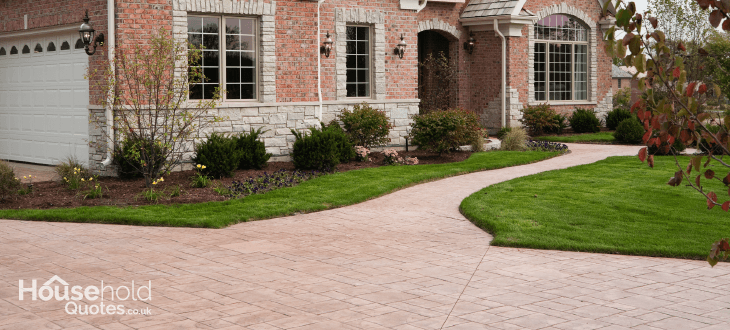
Stamped concrete driveways are a versatile and attractive option for those looking to enhance their property's curb appeal. Similar to traditional concrete driveways, they offer practical benefits such as durability, longevity, and low maintenance.
However, stamped concrete has the added advantage of pattern design, making it one of the best budget driveway ideas available.
Stamped concrete involves pressing patterns or textures into freshly poured concrete, creating the look of brick, stone, slate, or other materials at a fraction of the cost.
The primary advantage of stamped concrete is its ability to mimic more expensive materials while providing durability and low maintenance of concrete.
The average cost of a 2-car driveway with stamped concrete is around £5,825, according to Checkatrade. It is more expensive than traditional flat poured concrete because labour costs increase due to the time spent pressing the design into the concrete.
With proper installation and maintenance, stamped concrete driveways can withstand heavy traffic, harsh weather conditions, and long-term use, making them a durable and cost-effective choice for homeowners seeking functionality and aesthetic appeal.
How can you make an inexpensive driveway?
Creating an inexpensive driveway involves strategic planning and consideration of budget-friendly materials and techniques. It is essential to consider both the initial costs of a cheap driveway and the long-term costs associated with your chosen material.
Below we have provided some tips on how to obtain a cheap driveway which saves you time and money:
- Choose a simple design: When planning a driveway, it's essential to keep the design simple to keep costs low. You should consider the size and shape of your driveway. The most common shapes are straight, curved, or circular. If you opt for a straight driveway, you'll save money on materials and labour. However, if you choose a more complex shape, such as a curved driveway, you'll need more materials and labour, increasing the overall cost.
- Choose the right material: When choosing driveway material, prioritise durability over cost to reduce future expenses.
- Maintain your driveway properly: Regular maintenance, including resealing your driveway, removing weeds, and cleaning, can prolong its lifespan, prevent cracks and potholes, and boost your property's curb appeal even on a budget.
- Do it yourself: If you're looking for budget driveway ideas, you can save money by doing the work yourself. This includes excavating the site, levelling your driveway, and adding the material. However, it's important to ensure that the preparation and construction of your driveway are done correctly to ensure its longevity and functionality.
DIY-ing a driveway is a cost-effective option since it eliminates labour costs for hiring a professional. However, this approach may lead to long-term costs if the driveway is not installed correctly.
Mistakes made during DIY installation can result in poor drainage, uneven surfaces, and premature deterioration, which may require costly repairs down the line.
On the other hand, hiring a professional driveway installer is a pricier option. Still, it can offer better quality, longevity, and overall value in the long run.
Professionals have the knowledge, skills, and equipment to prepare the site correctly, select suitable materials, and execute the installation, resulting in a durable and long-lasting driveway.
Finding a trustworthy driveway installer can be daunting, and comparing quotes from multiple installers can be time-consuming.
That's where Household Quotes comes in. We offer four free, non-binding quotes from local driveway installers, so you don't have to spend hours searching for the right installer.
With more time on your hands, you can consider budget-friendly driveway ideas that meet your needs and preferences.
Don't risk costly mistakes. Fill out our 30-second form to get four quotes from trusted driveway specialists today. Click below to begin!
- Describe your needs
- Get free quotes
- Choose the best offer
It only takes 30 seconds

FAQ
The cheapest type of driveway is gravel, as the material is readily available and requires minimal installation labour. Gravel driveways are a practical choice for those looking to reduce material and labour costs.
Creating a straight driveway is the cheapest form compared to a curved or circular driveway. It’s best to keep the driveway simple and minimise its size and complexity to save expenses. Larger or more intricate designs usually require additional materials and labour, leading to higher costs
To create an inexpensive driveway, choosing the right material that balances low cost and high durability is essential. This way, you can save money on both initial and future expenses. For instance, opting for a simple design like a straight driveway can help reduce material and labour costs. Additionally, regularly maintaining your driveway can ensure it lasts longer, further reducing future expenses.
Concrete is the most low-maintenance driveway material, as it is considered one of the most durable materials available. The durability means fewer repairs are needed. Furthermore, a concrete driveway typically has a smooth surface, which means it is easier to clean and only requires the occasional sweep to remove debris.
A tar-and-chip driveway is a cheap alternative to a gravel driveway. It is quite similar to asphalt and much cheaper than gravel. However, while tar-and-chip driveways are less expensive than gravel, they have a shorter lifespan and will only remain functional for up to 10 years. Therefore, it’s essential to consider this before choosing this cheaper option.

Caoimhe is an experienced content writer and researcher who is passionate about providing accessible information to every reader. With a background in English literature and Sociology, she combines the two disciplines to create cohesive, well-thought-out, and well-informed pieces.
